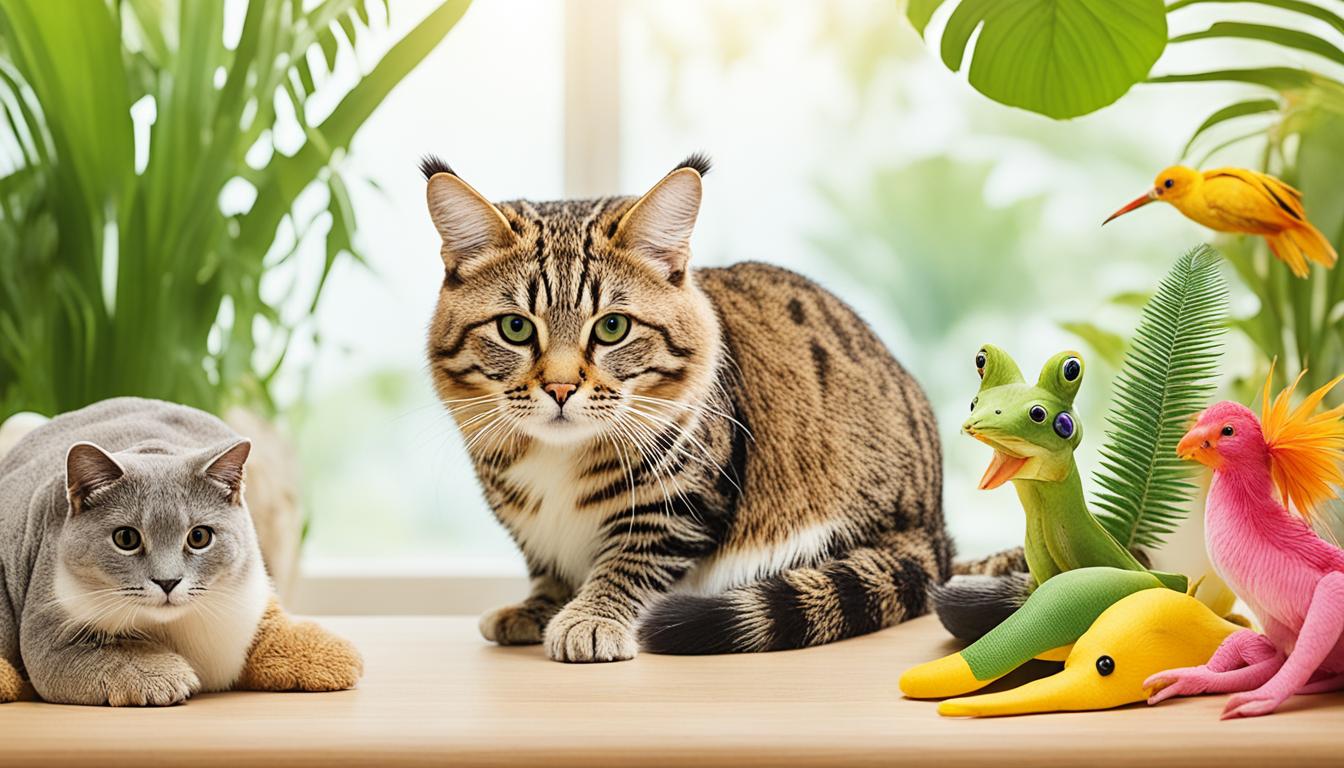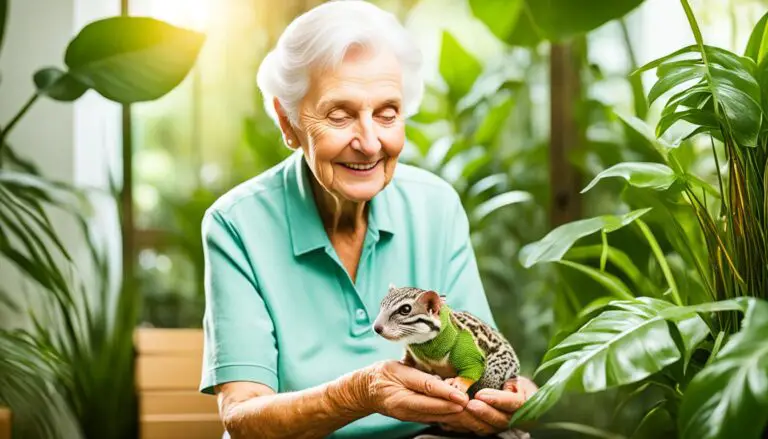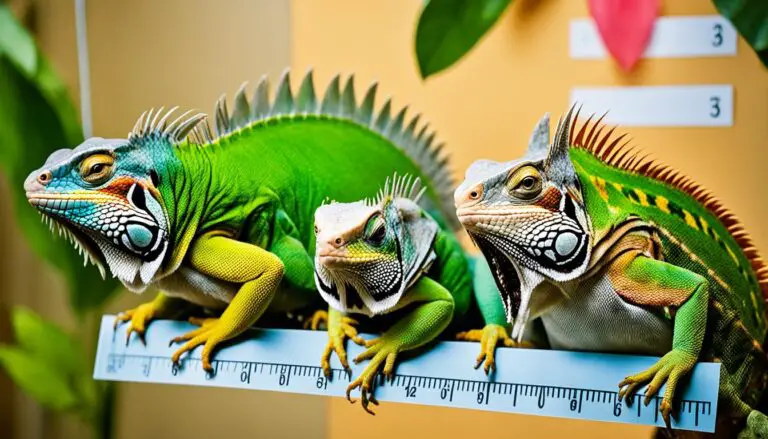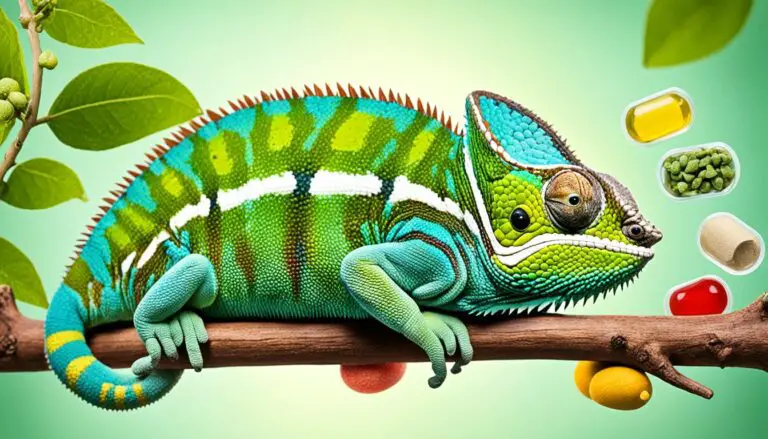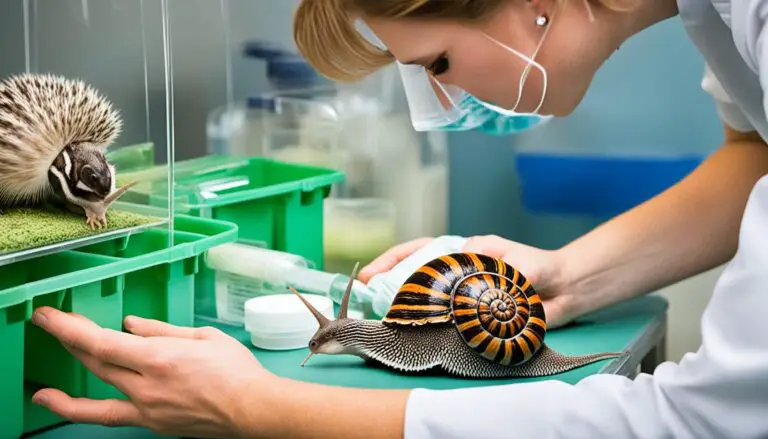Exotic Pet Stress Reduction Tips & Advice
Exotic pets can experience stress, which can negatively impact their well-being. To ensure your pet’s mental well-being and tranquility, it is important to know how to relieve their stress. This article provides tips and advice on reducing stress in exotic pets.
Exotic pets, such as reptiles, birds, and small mammals, have unique needs and behaviors that can contribute to their stress levels. Understanding these factors and implementing stress reduction techniques is crucial for their overall health and happiness.
Key Takeaways:
- Exotic pets can experience stress, which can negatively impact their well-being.
- Understanding the specific needs and behaviors of your exotic pet is essential for stress reduction.
- Maintaining the correct temperature and lighting, choosing the right substrate, and providing hiding places are important for reducing stress in exotic pets.
- Exotic pets have unique needs that may differ from traditional pets, requiring specific care and consideration.
- Interacting with exotic pets can have positive effects on mental health, reducing stress and providing emotional support.
How to Relieve Stress in Exotic Pets
To effectively relieve stress in exotic pets, it is crucial to understand their unique needs and behaviors. While providing the basic requirements such as heat, food, water, and space is essential, it may not be sufficient to alleviate stress in these emotionally complex creatures.
By familiarizing yourself with your exotic pet’s natural behavior, feeding habits, and activity patterns, you can better cater to their specific needs and reduce their stress levels. It is important to be attentive to the signs of stress that your pet may exhibit.
- Hiding during the day: Diurnal animals may hide more often when stressed.
- Being active during the day: Nocturnal animals may exhibit increased activity when stressed.
- Rigid immobility: Some reptiles may freeze, becoming rigid and motionless when stressed.
- Striking or biting: Aggressive behavior like striking or biting can be a sign of stress.
- Constant attempts to escape: Exotic pets may demonstrate a desire to escape when stressed.
- Spending time on the ground: Arboreal animals may spend more time on the ground when stressed.
- Not feeding or regurgitating food: A loss of appetite or regurgitation can indicate stress in exotic pets.
By recognizing and addressing these signs of stress, you can provide a more conducive environment and implement suitable stress reduction techniques, promoting the overall well-being of your exotic pet.

Importance of Temperature for Exotic Pets
Proper temperature is paramount to the well-being and overall health of exotic pets. For reptiles, in particular, maintaining the correct temperature is essential for digestion, organ function, and stress management. Extreme temperatures, whether too low or too high, can lead to stress and illness in these delicate creatures. It is crucial for exotic pet owners to monitor the temperature using a digital thermometer and provide suitable heating sources to ensure their pets’ wellness and reduce stress levels.
Reptiles rely on their environment to regulate their body temperature, a process known as thermoregulation. If their enclosure lacks the necessary temperature range, it can disrupt their bodily functions, impacting their overall health and happiness. For example, if the temperature is too low, reptiles may experience difficulty digesting their food, leading to nutritional deficiencies and increased stress levels. Conversely, if the temperature is too high, it can result in dehydration and heat-related illnesses.
To create an optimal temperature gradient for your exotic pet, it is essential to provide a heat source that allows them to choose their preferred temperature. This can be achieved through the use of heat lamps, heat pads, or radiant heat panels, depending on the specific needs of your pet species. By offering these heat sources, you allow your pet to thermoregulate effectively, ensuring they can warm up or cool down as needed.
It’s important to research the specific temperature requirements of your exotic pet species to create a suitable environment. Different reptiles have different thermal preferences, depending on their natural habitat. Some may require a basking spot with a higher temperature, while others may prefer a cooler area for hiding or resting.
| Temperature | Effects on Exotic Pets |
|---|---|
| Too low |
|
| Too high |
|
By understanding and maintaining the appropriate temperature range for your exotic pet, you can contribute to their overall wellness and mitigate potential stressors. Regularly monitor the temperature within their enclosure to ensure it remains within the optimal range. This proactive approach to temperature management is crucial for the long-term health and happiness of your exotic pet.

The Role of Lighting in Exotic Pet Stress Reduction
Lighting plays a crucial role in reducing stress and promoting the mental well-being of exotic pets. Just like humans and other animals, exotic pets benefit from a holistic approach to their health, which includes addressing their environmental needs. Providing the right lighting conditions is an essential aspect of this approach.
Many exotic pet species, such as reptiles, benefit from UV lighting as it mimics natural sunlight and aids in their physiological processes. Diurnal reptiles, in particular, require adequate UV lighting to regulate their metabolism and vitamin D synthesis.
Additionally, providing the right basking light is key to creating a natural spectrum that will stimulate normal behavior in exotic pets. Reptiles, for example, rely on basking to thermoregulate, digest their food properly, and maintain their overall well-being.
It is important to avoid using red bulbs as they can disrupt the natural visual spectrum of exotic pets. Instead, opt for lighting options that closely mimic their natural habitat and promote a sense of tranquility.
Benefits of Proper Lighting for Exotic Pets
Proper lighting in exotic pet enclosures offers various benefits, including:
- Supporting physiological processes and overall health
- Facilitating normal behavior and activity patterns
- Reducing stress and anxiety
- Promoting better appetite and digestion
Understanding the lighting needs of your specific exotic pet species is crucial for their well-being. Consulting with a veterinarian or exotic pet specialist can provide valuable guidance on selecting the right lighting setup for your pet’s enclosure.

Choosing the Right Substrate for Exotic Pets
The substrate or flooring material used in an exotic pet’s enclosure can significantly impact their stress levels and overall well-being. Providing a suitable substrate that closely resembles their natural habitat is crucial for reducing stress and promoting a sense of security. Different species have varying substrate preferences, such as dirt, rocks, or leaf litter, depending on their natural environment. By understanding your pet’s specific needs and replicating their natural habitat, you can create an environment that allows for natural behaviors like burrowing or resting, ultimately reducing stress levels in your exotic pet.
Benefits of Choosing the Right Substrate:
- Enhances psychological well-being: A proper substrate helps mimic the natural environment, offering a familiar and comfortable setting for your exotic pet.
- Promotes natural behaviors: Certain substrates allow for activities such as burrowing or digging, which are essential for species that exhibit these behaviors in the wild.
- Provides a sense of security: The right substrate can provide a substrate that closely resembles it. Different species have different substrate preferences, such as dirt, rocks, or leaf litter. Using appropriate substrate can provide a sense of security and allow for natural behaviors like burrowing or resting.
It is crucial to research the specific needs and natural habitat of your exotic pet to determine the most suitable substrate. Doing so will not only reduce stress levels but also promote a healthier and more fulfilled life for your unique companion.

| Exotic Pet Species | Recommended Substrate |
|---|---|
| Bearded Dragon | Reptile carpet or sand-free substrate |
| Chinchilla | Dust-free and absorbent bedding, such as aspen shavings or paper-based materials |
| Hedgehog | Paper-based bedding or fleece liners |
| Tarantula | Coconut fiber substrate or non-aromatic soil |
| Gecko | Reptile carpet, paper towels, or coconut fiber substrate |
Creating Hiding Places for Exotic Pets
Providing hiding places for exotic pets is essential for reducing stress and promoting a sense of safety. Exotic pets have natural instincts to hide when they perceive a threat, even if they are in a domestic environment.
Utilizing items like coconut hides, resin caves, cork bark, or large branches can give your pet places to retreat and feel secure. These hiding spots mimic the natural environments where they would seek shelter in the wild.
The availability of hiding places can contribute to reduced stress levels in exotic pets. It gives them a space where they can retreat when they feel overwhelmed or anxious. Hiding spots also provide a sense of security, helping your pet feel more at ease in their enclosure.
Creating hiding places is particularly important for nocturnal species that are active during the night and need a safe space to rest during the day.
“Providing suitable hiding places for your exotic pet is crucial for their well-being. It allows them to feel secure and reduces stress. Just like in the wild, they need a safe haven where they can retreat and relax.”
When choosing hiding places for your exotic pet, consider the natural habitat of their species. Research their hiding preferences and provide options that mimic their natural environments. This will help to create a more comfortable and stress-free living space.
Benefits of Providing Hiding Places for Exotic Pets:
- Reduces stress and anxiety
- Promotes a sense of safety and security
- Mimics the natural environments of exotic pets
- Provides a designated space for relaxation and rest
- Encourages natural behaviors and instincts
By incorporating hiding places into your exotic pet’s enclosure, you are prioritizing their mental well-being and creating a harmonious environment that supports their natural instincts.
Unique Needs of Exotic Pets
Owning an exotic pet comes with unique responsibilities and considerations. These animals have specific environmental, dietary, and healthcare needs that may differ from traditional pets. It is important to research their natural habitat and replicate it as closely as possible. Their diet should also match what they would eat in the wild to ensure proper nutrition. Regular visits to an experienced exotic pet veterinarian are necessary for their healthcare and well-being.
Environmental Needs
Exotic pets often require specialized environments to thrive. Each species has specific temperature, humidity, and lighting requirements. For example, reptiles and amphibians need optimal heat and humidity levels to regulate their body temperature and support their metabolism. Some exotic pets, such as birds, may need a diverse living space with perches, branches, or toys for mental stimulation.
Dietary Needs
The diet of an exotic pet should closely resemble what they would eat in their natural habitat. Research the specific nutritional requirements of your pet’s species and provide them with a well-balanced diet. Some exotic pets, like reptiles, may need a combination of live insects, fruits, and vegetables, while others, like small mammals or birds, may require a mix of seeds, pellets, and fresh fruits and vegetables.
Healthcare Needs
Regular veterinary care is crucial for exotic pets to ensure their health and well-being. Exotic animals can have unique health concerns and may require specialized medical treatments. Find a veterinarian with experience in exotic pet care who can provide regular check-ups, vaccinations, and preventive care. They can also guide you on parasite control, dental care, and any specific health issues related to your pet’s species.
When it comes to exotic pet health, proactive care is key. Pay attention to any changes in behavior, appetite, or appearance, as these can be signs of underlying health issues. Providing a stress-free environment, a proper diet, and regular veterinary check-ups will help keep your exotic pet happy and healthy for years to come.
Benefits of Exotic Pets for Mental Health
Interacting with exotic pets can have a profound positive impact on our mental well-being. Studies have consistently shown that spending time with pets, including exotic ones, can greatly reduce stress levels and promote a sense of tranquility. These unique animals possess the remarkable ability to lower cortisol, the stress hormone, and increase serotonin, the feel-good hormone, in their human companions.
When you care for an exotic pet, you not only experience the joy of nurturing and bonding with a remarkable creature but also gain a sense of purpose and responsibility. The daily interaction and nurturing of your exotic pet can provide you with a deep emotional connection and a source of unwavering support.
“The unconditional love and companionship offered by exotic pets can be incredibly soothing and comforting. They can be a constant source of encouragement and provide a sense of calm amidst the chaos of daily life.”
However, it is crucial to choose an exotic pet that aligns with your lifestyle and capabilities. Each species has unique requirements, and it is essential to understand these needs and the commitment involved before bringing an exotic pet into your home.
The Mental Health Benefits of Exotic Pets:
- Reduces stress and anxiety levels
- Increases serotonin, the feel-good hormone
- Provides emotional support
- Fosters a sense of purpose and responsibility
- Promotes social interaction and companionship
Incorporating an exotic pet into your life can offer a unique opportunity to experience tranquility and find solace in the presence of these extraordinary creatures.
Considerations When Choosing an Exotic Pet
Before deciding to own an exotic pet, there are several factors to consider. Your lifestyle, allergies, the longevity of the pet, and legal considerations should all be taken into account. Exotic pets require specific care and may have different needs compared to traditional pets. It is important to choose a pet that aligns with your lifestyle and provides the appropriate care for their well-being.
Factors to Consider
- Lifestyle: Exotic pets have unique care requirements and may need specialized enclosures or diets. Consider if you have the time, resources, and dedication to provide for their needs.
- Allergies: Some exotic pets may produce dander or have specific proteins that can trigger allergies. It’s important to research and interact with the species you are considering to ensure you won’t have adverse reactions.
- Pet Longevity: Exotic pets can have significantly longer lifespans compared to traditional pets. Consider if you are prepared for the commitment and responsibility of caring for a pet that may live for several decades.
- Legal Considerations: Check your local regulations and laws regarding ownership of exotic pets. Some species may require permits or have restrictions.
When selecting an exotic pet, it’s crucial to research and gather as much information as possible. Carefully consider the unique requirements of the species you are interested in, including their habitat, diet, social needs, and health concerns. It’s also advisable to consult with experienced exotic pet owners or reputable breeders who can provide guidance and answer any questions you may have.
Tip: Always prioritize the well-being and welfare of the animal. Don’t choose an exotic pet simply for novelty or appearance. Ensure that you can provide the necessary care and environment for the animal to thrive.
To further illustrate the considerations when choosing an exotic pet, here is a helpful table highlighting some popular exotic pets, their unique needs, and potential stress reduction techniques:
| Exotic Pet | Unique Needs | Calming Techniques |
|---|---|---|
| Bearded Dragon | UV lighting, controlled temperature, appropriate substrate | Providing hiding spots, regular handling, gentle interactions |
| Ball Python | Temperate environment, proper humidity, secure enclosure | Using a proper heat source, providing deep hiding areas, regular handling |
| Sugar Glider | Social interaction, specialized diet, large cage with climbing opportunities | Bonding pouches, interactive toys, regular out-of-cage playtime |
Remember, each exotic pet has its own specific needs and requirements. It’s important to gather accurate information and consult with experts to ensure you can provide a suitable and stress-free environment for your exotic companion.
Conclusion
Proper care and attention are essential when it comes to exotic pets. These unique companions bring joy and companionship to our lives, but it is our responsibility to understand and meet their specific needs. By implementing stress reduction techniques, creating suitable environments, and providing appropriate care, we can ensure the mental well-being and tranquility of our exotic pets.
Reducing stress in exotic pets starts with understanding their natural behaviors and instincts. By closely mimicking their natural habitats, providing them with hiding places, and choosing the right substrate, we can create a sense of security and promote a stress-free environment. Monitoring temperature and providing appropriate lighting also play crucial roles in their overall well-being.
Alongside physical care, it is important to research and meet their dietary and healthcare needs. Consulting experienced exotic pet veterinarians and providing a well-balanced diet can contribute to their overall health and reduce stress levels. Remember, owning an exotic pet is a unique responsibility and requires commitment, but by taking the time to understand their needs, a fulfilling and harmonious relationship can be achieved between humans and exotic pets.
FAQ
What are some signs of stress in exotic pets?
How important is temperature for exotic pets?
What role does lighting play in reducing stress in exotic pets?
How does the substrate or flooring material affect exotic pets’ stress levels?
Why are hiding places important for exotic pets?
What are the unique needs of exotic pets?
How can owning an exotic pet benefit mental health?
What should I consider when choosing an exotic pet?
How can I reduce stress in my exotic pet?
Why is it important to research and meet the specific needs of exotic pets?
Source Links
- https://www.evolutionreptiles.co.uk/blog/reducing-stress-in-your-pet/
- https://www.absoluteexoticssa.co.za/animal-blog-news/general-exotic-animal-articles-exotic-pet-content/440-exotic-pets-and-mental-health-the-therapeutic-benefits
- https://petremedy.co.uk/owning-an-exotic-pet/
Peter Stones is the founder of Exotic Pets Place, the leading online resource for exotic pet care information.
With over 10 years of hands-on exotic pet ownership experience, he is deeply passionate about sharing his expertise to help others properly care for their unusual pets.
When he's not writing extensively researched articles or connecting with fellow exotic pet enthusiasts worldwide, you can find Peter at home tending to his own beloved menagerie of exotic animals.

